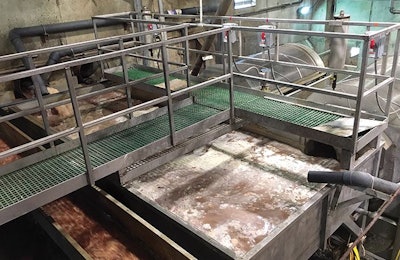
Tyson Foods Inc.’s Robards, Kentucky, wastewater pre-treatment operation does more with less.
For its exceptional performance using fewer resources, Tyson Foods Inc.’s operation in Robards, Kentucky, was selected as the winner of the 2020 U.S. Poultry & Egg Association’s Clean Water Award in the pre-treatment category. Judges were impressed with how the facility is able to treat as much water as it does using the equipment it employs.
The pretreatment category covers facilities that discharge pretreated effluent to a publicly owned, full treatment facility for further treatment. To be eligible, a facility must have a minimum of two years of no significant non-compliances or notices of violations or any other type of enforcement action. Judging is based upon training, unique processes utilized for treatment, community outreach, wildlife management, water conservation and general environmental stewardship.

From left: Mark Badertscher, Ron Chapman, Sean Ogungbenle, Mauricio Porras, Tyson Foods Inc. (Courtesy Tyson Foods)
Wastewater pre-treatment
Tyson’s Robards complex is home to a poultry processing and rendering facility. Its pre-treatment operation processes about 250,000 birds per day and handles an average of 2.2 million gallons of wastewater daily.
The wastewater operation utilizes two dissolved air flotation (DAF) units. One uses an auger designed to remove sediments of poultry byproducts that collect in the unit. The sediment can damage other machinery as it moves through the treatment system, so capturing it extends the life of critical equipment and preserves the health of the system.
Environmental stewardship
Robards is taking steps to continue to conserve water at other areas in the plant. It recycled water for non-contact purposes such as washing out blood transport tankers. Recycled water is also pumped into the plant to supplement the fresh water being used to move feathers through the pre-treatment system.
The wastewater system was recently modified so it can dump two, 42,000 gallon chillers twice, instead of five times, a week. This procedure has the potential to reduce the facility’s potable water consumption by 250,000 gallons a week.
The facility contains a rendering plant, which helps reduce overall food waste, and recycling programs to reduce landfill contribution. It recycles cardboard, plastics, scrap metal, wooden pallets, used cooking oil, used batteries, used lamps and used mercury containing equipment.
















